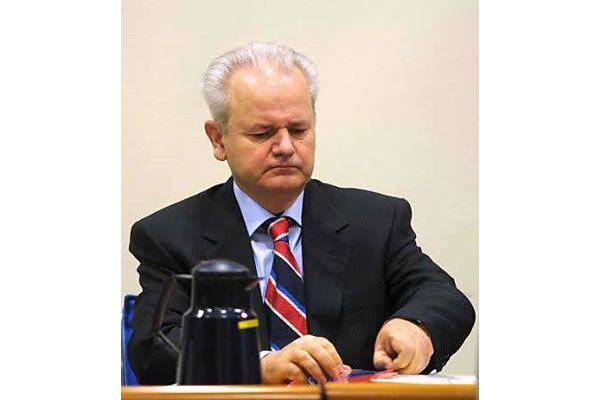Home
WHY KARADZIC SHOULD BE IN MILOSEVIC'S BAD BOOKS
Rash statements by Radovan Karadzic and other Bosnian Serb leaders led judges to conclude that Slobodan Milosevic shared their goal and intention to destroy Bosnian Muslims in part; in other words, to commit genocide.
 Slobodan Milosevic in the courtroom
Slobodan Milosevic in the courtroom If they ever meet in the corridors or in the communal area of the UN Detention Unit, or as they walk in the yard, Slobodan Milosevic has every reason to upbraid Karadzic, saying something along the lines of, “Didn't I warn you, Mophead, to watch what you are saying over open telephone lines or as you took the floor in the Assembly, never mind if the sessions were open or closed?”
[In several intercepts played before the court, Milosevic warns Karadzic to "watch where he is speaking from and what he is saying"; "Mophead" is the codename for the Bosnian Serb leader used by Milosevic's closest associates. For instance, in a telephone conversation dated 11 December 1995, Zoran Lilic tells General Momcilo Perisic, "This mophead guy called late last night, at about 12 o'clock. I don't want him to spoil something now. He's trying to push the Russians in there again, you know."]
Reasons for the scolding can be found in a decision made public last week, dismissing an amici curiae motion to drop counts 1 and 2 from the BH indictment. In those counts, Milosevic is charged with genocide and complicity in genocide. The Trial Chamber decided that enough evidence has been presented to warrant a finding of guilt for genocide if the accused fails to successfully challenge it in his defense case. Judges concluded that Milosevic, together with the Bosnian Serb leadership, participated in a joint criminal enterprise, the aim and intention of which was to destroy Bosnian Muslims in part "as such."
In proving responsibility for genocide, the most difficult part is proving specific intent: to destroy an ethnic or religious group, in whole or in part, as such. The intent is usually not communicated openly and publicly. It is not put on paper. If Milosevic indeed had this intent, he made sure not to make it publicly known.
Not so the Bosnian Serb leadership, primarily Karadzic. In the part of the Trial Chamber’s decision entitled "Evidence of genocidal intent of Bosnian Serb leadership," a dozen Karadzic statements are quoted – from transcripts of open or closed Bosnian Serb Assembly sessions and from intercepts – expressing the intention to exterminate and destroy Bosnian Muslims and to make them “disappear” as an ethnic and religious group.
For instance, in intercepted telephone conversations with Gojko Djogo, Momcilo Mandic and Miodrag Davidovic in October 1991, Karadzic is saying that if there is a war, Muslims "will disappear from the face of the earth"; that "in just a couple of days, Sarajevo will be gone and there will be five hundred thousand dead"; and "in one month Muslims will be annihilated in BH" while their leaders will "all be killed in three or four hours" and "none of them would survive." Karadzic's speech delivered at the 17th Closed Session of the Bosnian Serb Assembly in July 1992 is also quoted. He says that the conflict in BH was "incited so that the Muslims would not exist."
In truth, Karadzic was not the only Bosnian Serb leader to speak rashly about his intentions. The Trial Chamber’s decision quotes similar statements by other leaders: Biljana Plavsic; Aleksa Buha; Momcilo Krajisnik; even the then health minister, currently the speaker of the RS National Assembly, Dragan Kalinic, who, according to the minutes of the 16th session of the Assembly held in May 1992, allegedly said, "… knowing who our enemies are, how perfidious they are, how they cannot be trusted until they are physically, militarily destroyed and crushed, which, of course, implies eliminating and liquidating their key people….”
Although Milosevic never said anything of the sort, the Trial Chamber concluded that he shared the genocidal intent of the Bosnian Serb leadership. As they explained in the decision, they based their conclusion on his position as the "leader of all Serbs," his advocacy of the "concept of Greater Serbia," the logistic and financial support that Serbia provided for the Bosnian Serb war effort, the nature of his relationship with the political and military leadership of Serbs in Bosnia, the authority and influence he had over them, his knowledge of everything that was going on, and the scale, pattern and intensity of attacks on Bosnian Muslims, the substantial number of people killed, the brutal treatment in detention centers and the liquidation of figures essential to the survival of Muslims as a group.
On the basis of all this, the Chamber drew its conclusion that Milosevic not only knew about the genocidal plan of the Bosnian Serb leaders, but shared the intent that Karadzic et al. so recklessly flaunted in public.
Linked Reports
- Case : Milosevic Slobodan - "Kosovo, Croatia and Bosnia"
- 2004-06-17 UNLIMITED NUMBER OF WITNESSES, BUT IN LIMITED TIME
- 2004-06-17 MILOSEVIC WILL HAVE TO WRITE, IF HE WANTS CLINTON AND BLAIR
- 2004-06-16 MILOSEVIC'S GENOCIDE CHARGES FOR BOSNIA REMAIN
- 2004-07-05 “RADICAL REVIEW" OF THE CONTINUATION OF THE MILOSEVIC TRIAL
- 2004-07-06 PROCEDURE TO APPOINT DEFENSE COUNSEL FOR MILOSEVIC SET IN MOTION
- 2004-07-15 THE PROCEDURE FOR THE ASSIGNMENT OF DEFENCE COUNSEL FOR MILOSEVIC SPEEDED UP
